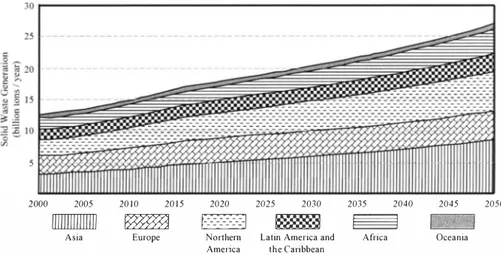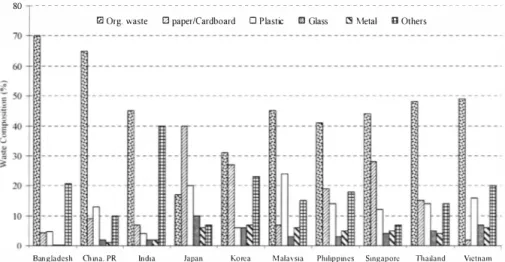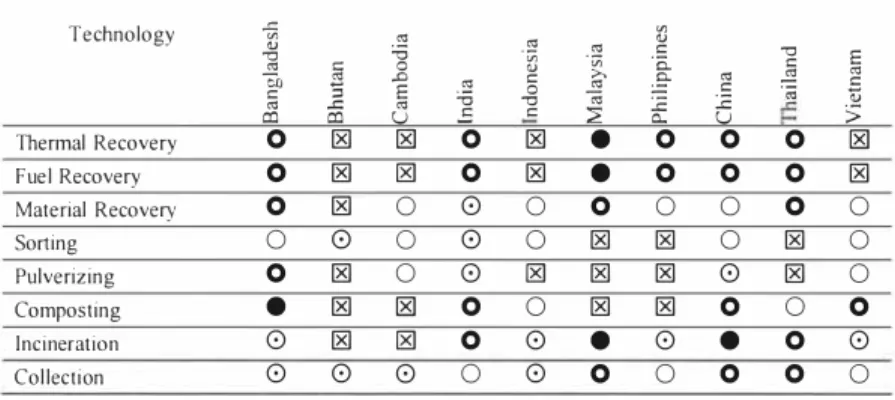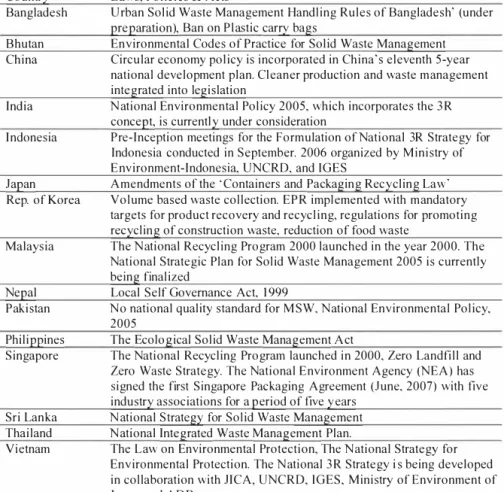KALMAR, SWEDEN, November 26-28, 2007
3R PRACTICES FOR MUNICIPAL SOLID
WASTE MANAGEMENT IN ASIA
C. Visvanathan
Radha Adhikari
A. Prem Ananth
Asian Institute of Technology, Thailand
ABSTRACT
Extraordinary emerging consumption statistics from the developing Asian countries has clearly indicated the increase waste generation over the past decades. Most of the developing Asian countries are experiencing solid waste management problem in terms of collection efficiency, disposal facilities, limited financial resources and weak policy interventions. Unlike developed nations, final disposal of solid waste in developing Asian countries is usually a matter of transporting the collected waste to the nearest available space for disposal. Moreover, sustainability of landfills has become a challenge in Asia due to various considerations such as availability of space, technologies for gas capture and leachate treatment, tropaical climatic condition and waste characteristics. Plastic and paper wastes are dominating due to rapid economic development. Treating waste as a resource is the first step towards sustainable waste management and conserving resources. As for the biodegradable waste, feasible treatment technologies such as composting and anaerobic digestion with attractive results have been established. The non-biodegradable waste fractions are to be managed by implementing the 3Rs: Reduce, Reuse and Recycle. This article attempts to give a picture of the ongoing 3R implementation in urban municipal solid waste management in Asian countries. It was observed that in most of Asian countries, informal activities highly dominate due to lack of funding, government initiation, lapse in policy and public ignorance on waste management issues.
KEYaWORDS
Municipal Solid Waste, Reduce, Reuse, Recycling, 3R, Technology Gaps. I I NTRODUCTION
Current paces of urbanization, consumerist societies and waste generation have challenged global sustainability in many ways. With the unplanned urbanizations and rapid growth of middle class families with changing lifestyles, most of the Asian countries are facing an enormous challenge of managing urban waste. Predictions on global waste generation levels are presented in Figure 1. A study conducted by the World Bank, reveals that urban areas in Asia generate about 760,000 tonnes of Municipal Solid Waste (MSW) or approximately 2.7 million 1113 per day; and in 2025 it is expected to reach 1 .8 million tonnes of waste or 5.2 million 1113 of waste per day [ 1 ] . According to Center for Science and Environment, India' s --oown To Earth", urban India produces 1 20,000 tons of MSW each day [2]. Population growth along with the rapid urbanization and industraialization has created great pressure on
�
�
�
the limited natural resources. Sustainable use and management of natural resources, therefore, have become the focus of national concern. The Ecological Footprint of the Asia-Pacific region has risen by more than 1 30% since 1 96 1 , now requiring 1 .3 global hectares of biologically productive area per person [3]. From all these, it is evident that only 3 R could play a major role in terms of managing the waste and conserving natural resources.
2000 2005 20 1 0 20 1 5 2020 2025 2030 2035 2040 2045 2050
illIIIIIIIIlID
Em
-Asia Europe Northern Latin America and Africa Oceania America the Caribbean
Figure I. Predictions of global waste generation level [4}.
-In the past, managing solid waste was simply transporting waste to distant places for dumping. Only a fraction of waste was properly collected and transported. Sometimes they were burnt to reduce the volume, minimize attraction of animals and vermin and to retrieve recyclable items. However, these practices are being challenged due to the increasing value of land, inadequate space, and the limited carrying capacity of the environment, ultimately posing a threat to human health. Many countries in the Asian region have been facing looming waste crises with unsuitable technology and lack of manpower to effectively treat the generated waste. Although some governments have recently formulated and incorporated measures and cleaner production options to tackle the waste crisis, most of these have been implemented only in the national capital cities. In the recent years, 3R ( Reduce, Reuse, Recycle) initiatives, replication of good practices and educational campaigns have been promoting the values of integrated waste management and resource consumption.2 REDUCE, REUSE AND RECYCLE (3RS) IN ASIA
The "3R Initiative" was officially launched at the 3R Ministerial Conference hosted by the Government of Japan in April 2005, with an aim to promote global action on 3R. In March 2006, a Senior Officials Meeting on 3 R was organized in Japan resulting in strong
KALMAR, SWEDEN, November 26-28, 2007
commitment of governments and other stakeholders to implement 3 R at local, national, and regional level.
2.1 Current practices of 3Rs in Asia
Tackling solid waste issues in the developing countries could be one of the most complicated and cumbersome task. Without any formal source segregation and with minimum public participation, almost all of the waste ends up in one common container or in an open backyard. Resource recovery and recycling usually takes place in all components of the system predominantly by the informal sector "waste pickers" or by the solid waste management staff themselves for extra income. Collecting, sorting, trading and recycling of disposed materials provide income to hundreds of thousands of people and are usually conducted by these scavengers under labor-intensive and unhygienic ways irrespective of the toxicity. In rural and peri-urban areas, urban municipal wastes generate a steady income despite the risks involved in treating and down cycling them to other consumer products. Many of these people work parallel to the formal solid waste system but in an informal manner. Recovered and recyclable products then enter a chain of dealers or processing before they are finally sold to manufacturing enterprises. However, the services of rag pickers often go unnoticed and issues concerning their livelihood are unaddressed. It has been estimated that about 20 to 30% of the waste generated in the cities of Asia Pacific region, are recycled by the informal sector. For example, in Bangladesh the informal sector is responsible for recycling about 4 to 1 5% of the total solid waste generated [5]. The situation in industrialized countries is very different, since resource recovery is undertaken by the formal sector, driven by law and a general public concern.
Recently, the importance of recycling activities m reducing waste volume, recovering resources and its economic benefits is being acknowledged. Many NGOs and CBOs are actively working on 3 R related issues, often in a decentralized manner failing to fit in the bigger picture due to lack of communication, networking and other factors. As of today, a long-standing practice and a complex networking of informal source separation and recycling of materials exists. In most cases, they were compelled to focus more on reusing and recycling of waste than on source reduction. Prioritizing the 3 Rs among themselves may not promise a drastic change within a short period, but will reap a significant reward in the long run.
2.2 Status and technology gaps in 3R im plementation
The composition of MSW differs for different countries and regions and plays a significant role in determining and designing an appropriate technology for treatment and allocating the space needed for treatment facilities. The MSW generated in most developing Asian countries is dominated by biodegradable organic fractions (above 40%) with the moisture content more than 50% [6]. Figure 2 presents the waste composition in the municipal solid waste of some Asian countries. The waste components are, in most cases, discarded or dumped without any treatment or recycling.
80 - - - ·
@ Org. waste l::J paper/Cardboard D Plastic l!I Glass � Metal El Others
Bangladesh Cn ina. PR India Japan Ko rea Malaysia Ph1hppmcs Singapore Thai.land Vietnam Figure 2. Composition of municipal solid waste in some Asian countries.
Most of the developing Asian countries are in a budding stage when it comes to implementing 3 R technologies. Such practices have been prompted by some private sector and NGOs to initiate recycling and proper waste management strategies. Waste Concern, an NGO in Dhaka, Bangladesh, for instance, has been actively involved in promoting 3R initiatives. Bangladesh has set an ideal example in successfully setting up decentralized composting systems throughout the country. Similar formal approaches are also observed in China, India and Thailand; but they still lack the basic support to make it strong and successful.
Technology applications for thermal recovery (direct combustion of waste to recover heat) and fuel recovery (RDF and PDF production from waste) are not observed in most of the Asian countries. These technologies are found to have been best applied only in the developed Asian countries. It was noticed that in China and Thailand, these technologies do exist but with an uncertainty in their efficiency both in terms of cost and environmental factors. Material recovery and sorting in MSW remains largely unexplored in many Asian countries. Although some pilot models have proved successful in developed countries, many details are yet to be determined in terms of implementation necessitating further research. Table I and 2 present the status and technology gaps in 3R implementation in developing and developed Asian countries, respectively. In developing countries, a chain of informal recyclers, from waste scavengers to the waste dealers, perform the task of material recovery and sorting. It is j ustifiable to state that their livelihood could be at stake provided such technologies are operational and commercially successful, which practically is not likely to happen at least in the coming years. Nevertheless, pondering upon the health risks and the resource conservation, these providing technologies or at least some formal registration and support
KALMAR, SWEDEN, November 26-28, 2007
from the governments is vital. It is undeniable that major focus should be paid to the 3 R technologies associated with M S W sorting, pulverization and composting.
Table I. Status and technology gaps in JR implementation in developing Asian countries.
Technology Thermal Recovery ii -0
.,
'" oiJC:'"
C!l 0 § ::i ..c: C!l 18)'"
'i3 0 ..c E '" u 18)'"
'i3 .E 0'"
· .;; C:.,
0 -0 C: 18) '" · .;; >,'"
,;�
•
C:�
·5.E
E c.. 0 C:'"
E u 0 -0 C: l:! ·;; 0 E '" C: 'i,>
18) Fuel Recovery 0 18) 18) 0 18)•
0 0 0 18) Material Recovery 0 18) 0 0 0 0 0 0 0 0 Soning 0 0 0 0 0 18) 18) 0 18) 0 Pulverizing 0 18) 0 0 18) 18) 18) 0 18) 0 Composting•
18) 18) 0 0 18) 18) 0 0 0 Incineration 0 18) 18) 0 0•
0•
0 0 Collection 0 0 0 0 0 0 0 0 0 0�
�
�
�
�
�
Table 2. Status and technology gaps in 3R implementation in developed Asian countries.
Reduce Status Reuse Status Recycle Status
Resource Conservation
•
Easier Disassembly•
Thermal Recovery•
Product Li fetime
•
Remaining L i fe•
Fuel Recovery
•
Extension Assessment
Japan Waste Reduction
•
Material Recovery 0Sorting 0
Pulverizing Composting
Resource Conservation
•
Easier Disassembly•
Thermal Recovery•
Product Li fetime
•
Remaining Life0 Fuel Recovery
•
Extension Assessment
Korea Waste Reduction
•
Material Recovery 0Sorting
Pulverizing Composting
Resource Conservation
•
Easier Disassembly•
Thermal Recovery•
Product Li fetime
□
Remaining Life□
Fuel Recovery
•
Extension Assessment
Singapore Waste Reduction
•
Material Recovery 0Sorting Pulverizing
Composting
Note on legends in Tables l and 2
• Formal, Strong 0 lnfonnal, Weak � Technology Gap
0 Formal but weak 0 lnfonnal but Strong
D
No infonnation• Formal and Informal denote the presence of regulations, laws and rules to govern an activity
• Strong and Weak represent the leveol and scale of a particular activity
• Where no law or rule exists and the practice is totally absent, it is denoted to be a gap. 3 LEGISLATIONS AND POLICIES
It is a very common practice in developing countries for people to dispose their waste openly or in an abandoned site. Environmental Legislations and Policies do exist in some form to protect their natural resources and environment, but most of them are not revised or updated according to the need and prevailing situation. In most cases, they do not create complications for the implementing body, but result in duplication of task and negligence in other activities. In cases, where they do exist, its implementation fails. The possible reasons for poor implementation could be a combination of social, technical, institutional and financial issues. Awareness, political will and public participation are essential for the successful implementation of the legal provisions.
0 0
KALMAR, SWEDEN, November 26-28, 2007
Many Asian countries have recently made progress on the legislative front and share common interest in tackling solid waste issues. Perhaps, most noteworthy is India's recent review and finalization of the National Environmental Policy which place due stress on the adoption of cleaner technologies, strengthening the informal sector in collection and recycling of various materials. Recycled Plastics Manufacture and Usage Rules, 1 999 was amended in 2003 and the Rules are applicable in all the States and Union Territories. In addition, strict enforcement is being ensured through the state authorities [7].
Several 3R initiatives such as Circular Economy in China, 5Rs policy in Indonesia and Zero Waste Society in Japan and Singapore have been implemented. Japan, Korea, Singapore, Taiwan and Hong Kong have made great strides in 3 R implementation. For example, in Japan, the final disposal of waste has reduced drastically and the recycling rate has gone up because of various 3 R legislations. Existing legislations, polices and acts in some Asian countries is presented in (Table 3).
Table 3. Waste management related policies and legislations in some Asian countries [8, 9}.
Country Laws, Policies & Acts
Bangladesh Urban Solid Waste Management Handling Rules of Bangladesh' (under preparation), Ban on Plastic carry bags
Bhutan Environmental Codes of Practice for Solid Waste Management China Circular economy policy is incorporated in China's eleventh 5-year
national development plan. Cleaner production and waste management integrated into legislation
India National Environmental Policy 2005, which incorporates the 3R concept, is currently under consideration
Indonesia Pre-Inception meetings for the Formulation of National 3R Strategy for Indonesia conducted in September. 2006 organized by Ministry of Environment-Indonesia, UNCRD, and IGES
Japan Amendments of the ' Containers and Packaging Recycling Law'
Rep. of Korea Volume based waste collection. EPR implemented with mandatory
targets for product recovery and recycling, regulations for promoting recycling of construction waste, reduction of food waste
Malaysia The National Recycling Program 2000 launched in the year 2000. The National Strategic Plan for Solid Waste Management 2005 is currently being finalized
Nepal Local Self Governance Act, I 999
Pakistan No national quality standard for MSW, National Environmental Policy,
2005
Philippines The Ecological Solid Waste Management Act
Singapore The National Recycling Program launched in 2000, Zero Landfill and
Zero Waste Strategy. The National Environment Agency (NEA) has signed the first Singapore Packaging Agreement (June, 2007) with five industry associations for a period of five years
Sri Lanka National Strategy for Solid Waste Management
Thailand National Integrated Waste Management Plan.
Vietnam The Law on Environmental Protection, The National Strategy for
Environmental Protection. The National 3R Strategy is being developed in collaboration with JICA, UNCRD, IGES, Ministry of Environment of Japan and ADB
4 FUTURE PROSPECTS OF 3R ACTIVITIES ENHANCING WASTE MANAGEMENT
In the race towards urbanization, many developing countries have witnessed the overflow of waste and depletion of natural resources at an alarming rate. Governments are becoming more aware of polluting sectors, and many NGOs and private organizations have been raising their voices against violations. One recent example is the failed recycling project of French War ship Clemenceau at the Alang shipyard in Gujarat, India.
KALMAR, SWEDEN, November 26-28, 2007
With huge investment demands from Asia's expanding cities for infrastructure investments, it will require special attention to promote various positive practices and implement new activities. Emphasis should also be laid on developing policy and mechanisms to promote 3R activities at the community and institutional level and integrating locally-tailored solid waste management systems based on upstream waste minimization and sound downstream disposal, emphasizing strong community participation throughout.
4.1 Promoting green procurement
New government regulations in Japan and the Republic of Korea require the adoption of green procurement practices, which will serve as models for other countries in Asia and the Pacific. Japan has enacted a law on the Promotion of Procurement of Eco-friendly Goods and Services by the State and Other Entities. Each ministry and agency is required to track annual purchases and report them to the M inistry of Environment. The law also requires manufacturers or service providers to provide information on the environmental impacts of items they sell. In addition, a Basic Policy on Green Purchasing was released in March 2004. About 45 types of eco-friendly goods and services are specified in the Basic Policy with procurement target guidelines for each. S imilarly, The Republic of Korea introduced similar mandatory green procurement for 20,000 public institutions in 2005. The Green Purchasing Law adopted in December 2004 and enforced in 2005 obligated public agencies to purchase environmentally friendly products or Eco-Products.
The Thai Green Purchasing Network founded in 2004 under the Greening the Supply Chain Model of the Thailand Environment Institute defines concepts and definitions of Green Purchasing and Procurement and Green Product in Thailand. Besides organizing information exchange forums among members and other organizations, it also provides guidelines about Green Purchasing procedure best practices [ I O].
4.2 Awareness activities - knowledge management
Although production and consumption is rising, awareness of citizens, corporations and governments is still low towards waste issues. Many stakeholders are involved in working toward a recycling-based society, and alal are needed to participate in overcoming the sheer inertia of resaistance to change. Therefore, it is important to enhance public awareness of 3R issues by coordinated action through environmental education and dissemination of information on successful inter-stakeholder partnerships. Figure 3 shows the awareness activities on packaging waste -Tetra Pak, Vietnam.
Figure 3. Packaging waste awareness -Tetra Pak, Vietnam [9].
4.3 Promoting a circular economy
The concept of Circular Economy (CE) should be promoted in Asian countries not only to resolve the waste issue but also to conserve its natural resources. Developed Asian countries like Japan, China and Korea are moving forward successfully in this concept. There are a number of ways to define the term Circular Economy. The accepted working definition may be interlinked to manufacturing and service businesses seeking the enhancement of economy and environmental performance through collaboration in managing environmental and resource issues. The theme of the CE concept is the exchange of materials where one facility's waste, including energy, water, materials as well as information is another facility's input. The new terms that are widely relevant are Eco-Industrial Networking and Industrial Symbiosis. These activities, if exercised correctly, could prove to be a stepping-stone towards sustainable Asian cities and possibly the best gift for our future citizens.
4.4 Creating regional recycling centers
An analysis of the present situation of waste management and the status of 3R-oriented activities has clearly indicated that recycling is often practiced in a decentralized and informal manner. Recycling activities in the developed countries, practiced in a formal manner with necessary policy, legislative and institutional support has proven to be successful. In view of this and the current situation, two possibilities arise for promoting recycling in a formalized manner. One is the promotion of regional recycling zones and second is the transfer of technology from developed to developing countries. This could eventually, be done by following an approach that first enables the creation of conducive policies and investment environment followed by regional inter-linking of the recycling zones. An inevitable component of this approach is technology transfer. International cooperation between countries, irrespective of the economic status, is essential to achieve success at a regional scale.
5 CONCLUSIONS
An overview of the current practices of waste management indicates that
KALMAR, SWEDEN, November 26-28, 2007
• Recycling is predominantly in the informal sector and uses primitive technology • Very little instances of promoting formal, 3R-based solutions for waste crisis exist • Specific policies emphasizing the need for 3R are very rare in Asian countries with
exceptions of some developed nations in the region.
• Technology transfer and policy reformulation are essential to promote 3Rs • Creating linkages between the recycling zones of countries is indispensable
• Cooperative and concerted efforts between and within countries are the need of the hour to promote a 3R-based economy.
Existing technology practices are not found to be sufficient to overcome the burden of waste in a sustainable manner. Simple technologies for 3Rs have to be made formal and strong by promoting new policies, reformulation of existing policies, cooperative efforts and technology transfer. Thus, the technologies chosen for waste management have to be tested for their sustainability, in addition to being environmentally effective, economically affordable and socially acceptable. Thus filling the gaps with such design is highly indispensable to move towards 3R as a means of solving the waste management problems.
As far as the implementation of 3Rs is concerned, Reduce and Reuse highly involves changes in human attitudes towards production and consumption patterns. This change has to begin at the grassroots with the commitment of all citizens of a country.
Recycling, which often takes place outside the purview of the consumer, depends largely on the technology base of the country. Developing and transferring appropriate, proven technologies forms a key component in successfully promoting recycling.
ACKNOWLEDGEMENTS
The authors wish to convey their gratitude to Asian Development Bank (ADB) and 3R knowledge Hub (3RKH) team for making this paper possible. Deep appreciation is extended to all the individuals, companies and organizations cited in this article.
REFERENCES
[ I ] World Bank, 1 999. What a waste: solid waste management i n Asia, Urban Development Sector Unit, East Asia and Pacific Region, The International Bank for Reconstruction and Development/The World Bank, Washington, DC, USA.
[2] CSE, Center for Science and Environment, Publication ' Down to Earth', http://www.downtoearth.org.in/ (accessed August 2006).
[3] WWF, 2005 .. The ecological footprint and natural wealth: Asia Pacific. Available online http://assets.panda.org/downloads/asialpr2005.pdf (accessed October I 0, 2007). [4] Yoshizawa, T., 2007. The global problems of waste and situation in Asia. Ministry of
Environment, Government of Japan publication.
[5] Enayetullah, I.,. Maqsood Sinha, E.H.Md., Akhter Khan, S.S., 2005. A report on urban solid waste management scenario of Bangladesh: problems and prospects. Waste Concerns publications Dhaka, Bangaladesh. Available online at www.wasteconcern.org (accessed August 2006).
[6] Asian Institute of Technology (AIT), 2004. Municipal solid waste management in Asia, Asian Regional Research Program on Environmental Technology (ARRPET), AIT, Thailand. ISBN : 974-4 I 7-258- 1 .
[7] SOM, 2006. Senior Official Meeting on the 3R Initiative, 6-8 March, 2006, JICA Institute for International Cooperation, Tokyo, JAPAN.
[8] Yisvanathan, C., 2006. Domestic waste management in South Asian countries: A comparative analysis. Synthesis report of 3 R South Asian expert workshop Katmandu, Nepal, 30- August- I September. (www.3rkh.net)
[9] 3R Knowledge Hub (www.3rkh.net).
[ I O] Kataoka, A., 2006. IGPN- International Green Purchasing Network and Green Purchasing Activities in Asia. Workshop on Green Manufacturing and Management for
Electronics Industry, Pune, India.
http://www.igpn.org/news/2006/04/igpn_reports_ on _green _manufact_ I .html (accessed August 2006.




![Figure 3. Packaging waste awareness - Tetra Pak, Vietnam [9]. 4.3 Promoting a circular economy](https://thumb-eu.123doks.com/thumbv2/5dokorg/3689158.45871/10.618.392.612.124.297/figure-packaging-awareness-tetra-vietnam-promoting-circular-economy.webp)